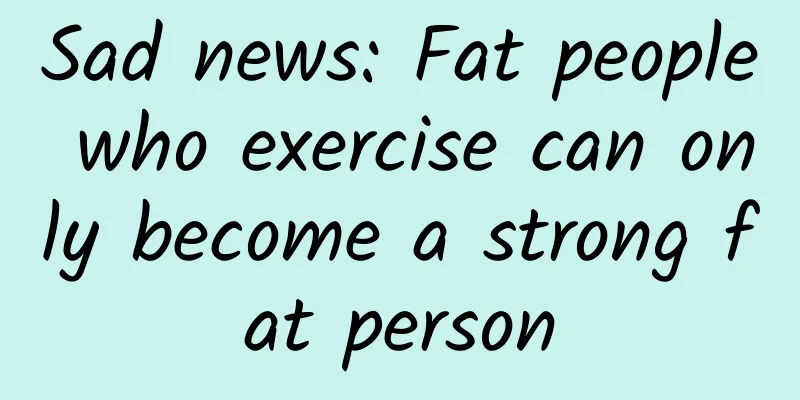Is it because of lack of vitamin D that you are not getting enough sleep even if you sleep 12 hours a day? You will know after reading this!

|
Recently, a netizen posted that he "always doesn't get enough sleep, 8 hours of sleep on weekdays and 12 hours of sleep on weekends, but still doesn't feel full." Because he saw someone say "it might be vitamin D deficiency", he went to the hospital for a check-up, and the result of the full test of 25-hydroxyvitamin D [25(OH)D] was only 5.52ng/mL (under normal circumstances, the body's vitamin D is sufficient when 25(OH)D≥20ng/mL). Does Vitamin D deficiency lead to insufficient sleep? Image source: a social platform 01 What does vitamin D do? First, let’s talk about what vitamin D is. Vitamin D is a fat-soluble vitamin that helps the body absorb calcium from food in the intestines, which is good for bone health. In addition, vitamin D also regulates many other cell functions in the body. The "Dietary Reference Intakes for Chinese Residents" clearly recommends that people aged 0 to 64 need to consume 400 IU of vitamin D every day (IU is the international unit, 400 IU of vitamin D is 0.01 mg). When we go to the hospital for a checkup, we usually check the level of 25-hydroxyvitamin D [25(OH)D] in the blood. According to the provisions of the Health Industry Standard of the People's Republic of China (WS/T) "Screening Method for Vitamin D Deficiency in the Population", when the 25(OH)D level in the blood is greater than 20ng/L, it indicates that the nutritional status of vitamin D is normal, and when it is lower than 12ng/L, it indicates deficiency. Methods for screening vitamin D deficiency in the population The biggest problem of vitamin D deficiency is that it can lead to osteoporosis. The netizen at the beginning of the article often suffers from "leg cramps", which may be related to vitamin D deficiency. But, can vitamin D deficiency cause sleep problems? 02 Always “Not Getting Enough Sleep” Is it a vitamin D deficiency? For those who "never get enough sleep", their sleep is likely to be " nonrestorative sleep (NRS)". In 1987, the American Psychiatric Association first listed "nonrestorative sleep" as a symptom of insomnia, which is described as a feeling of restless, light, or poor quality sleep, even though the duration of sleep may appear normal. The causes of non-restorative sleep are complex: there are psychological factors, such as mood disorders, and lifestyle factors, including alcohol, tobacco, and caffeine intake, as well as several other behaviors associated with poor sleep hygiene. However, there is no clear evidence that vitamin D deficiency is the main cause of "not getting enough sleep." As for other types of insomnia symptoms, some studies have found that vitamin D deficiency is related to insomnia and poor sleep quality. For example, some studies have found that the serum vitamin D levels of chronic insomnia patients are significantly lower than those of healthy people. However, these research results are not consistent. Copyright images in the gallery. Reprinting and using them may lead to copyright disputes. In 2021, a randomized controlled clinical study in Norway provided vitamin D supplementation to 189 people with vitamin D deficiency for 4 months. The results showed that vitamin D supplementation did not have a significant effect on improving sleep levels. In 2022, a systematic review and meta-analysis studied the effect of vitamin D supplementation on sleep quality. A total of 19 studies were included, including 13 randomized controlled studies. The results showed that compared with the placebo group, vitamin D supplementation was associated with a decrease in sleep index, but the level of evidence was only moderate. Moreover, the results of the effects of vitamin D supplementation on sleep difficulties and disorders were inconsistent. Therefore, the researchers believe that the effect of vitamin D supplementation on sleep needs further study. Overall, although vitamin D deficiency is associated with sleep disorders, vitamin D supplementation has no direct effect on the prevention or treatment of sleep disorders. 03 How to improve sleep? There are many complex factors that affect sleep. From the perspective of diet and lifestyle, it is recommended to start from the following aspects: 1. Pay attention to food diversity and balanced nutrition in your daily diet. Studies have found that a balanced diet and nutrition are good for overall health and also help us sleep well. 2. Eat a light dinner and don't eat too much spicy food. Studies have found that excessive intake of oil, salt, and fat and too little vegetables can easily lead to insomnia. Too spicy food can increase gastrointestinal irritation and affect sleep. 3. Don’t eat too late. Eating too late, especially close to bedtime, means that the food is not fully digested and the stomach is still full. You have to continue moving to digest the food, which is not good for sleep. It is recommended that you don’t eat within three hours before going to bed. 4. Don’t go to bed hungry. If you feel hungry before going to bed, you can eat some starchy foods, such as oatmeal porridge, millet porridge, etc. Copyright images in the gallery. Reprinting and using them may lead to copyright disputes. 5. Avoid strenuous exercise before going to bed. Appropriate exercise before going to bed can reduce light sleep, increase deep sleep, ensure sleep continuity, and improve sleep efficiency, which means it is easier to sleep through the night. But be careful not to do it too vigorously. 6. Don’t drink too much water before going to bed. Drinking too much water will easily cause you to have to go to the bathroom, which will inevitably affect your sleep. 7. Don't smoke, drink, or eat caffeinated foods before going to bed. Drinking will affect the quality of sleep, and smoking will only make you more and more excited and even more unable to sleep. Some people are more sensitive to caffeine. If you want a good sleep, it is best to avoid foods and drinks containing caffeine, such as coffee, tea, milk tea, cola, chocolate, and foods and drinks containing guanara extract and Paraguayan tea extract, which also contain caffeine. 8. Take a hot bath before going to bed, turn off the lights, stay away from mobile phones and other electronic screens, play fewer games and watch fewer TV series. These can all help you fall asleep. 04 How to supplement vitamin D? Although vitamin D supplementation has no direct effect on improving sleep problems, it is still very important for human health. There are two main ways for humans to obtain vitamin D: one is that the skin is exposed to ultraviolet rays in the sun and converts itself into vitamin D₃; the other is to obtain it from food. Animal foods are rich in vitamin D, such as dairy products, salmon, mackerel and sardines. Copyright images in the gallery. Reprinting and using them may lead to copyright disputes. If you want to get vitamin D, you should do more outdoor activities. Choose a time when the ultraviolet rays are not strong and stay in the sun for about 10 to 20 minutes . You can also eat more foods rich in vitamin D , such as dairy products, salmon, mackerel and sardines. If you are really worried about deficiency, you can also take vitamin D supplements . Taking vitamin D supplements usually has more benefits than disadvantages. References: [1] Roth T, Zammit G, Lankford A, Mayleben D, Stern T, Pitman V, Clark D, Werth JL. Nonrestorative sleep as a distinct component of insomnia. Sleep. 2010 Apr;33(4):449-58. doi: 10.1093/sleep/33.4.449. PMID: 20394313; PMCID: PMC2849783. [2] Liu Yaping, Pan Jiyang. Current status of research on non-restorative sleep[J]. Journal of Practical Medicine, 2012, 28(07): 1208-1210. [3] Diagnostic and Statistical Manual of Mental Disorders (4th edition) [4] Ohayon MM. Prevalence and Correlates of Nonrestorative Sleep Complaints. Arch Intern Med. 2005;165(1):35–41. doi:10.1001/archinte.165.1.35 [5] Vitamin D.Fact Sheet for Health Professionals.NIH [6] Holick MF. Vitamin D deficiency. N Engl J Med. 2007 Jul 19;357(3):266-81. doi: 10.1056/NEJMra070553. PMID: 17634462. [7] WS/T 677—2020 Screening method for vitamin D deficiency in the population. [8] Zhang Sai, Hao Yongci, Gu Ping. Relationship between serum vitamin D level, sleep quality and mood in patients with chronic insomnia[C]//China Sleep Research Society. Proceedings of the 14th National Academic Annual Conference of China Sleep Research Society. [Publisher unknown], 2022: 320. DOI: 10.26914/c.cnkihy.2022.025687. [9] Wang Chaoya, Wang Liecheng, Xu Shengchun. Meta-analysis of the correlation between sleep disorders and vitamin D levels[J]. Chinese Journal of General Practice, 2019, 22(8): 954-959. DOI: 10.12114/j.issn.1007-9572.2018.00.160. [10] Romano F, Muscogiuri G, Di Benedetto E, Zhukouskaya VV, Barrea L, Savastano S, Colao A, Di Somma C. Vitamin D and Sleep Regulation: Is there a Role for Vitamin D? Curr Pharm Des. 2020;26(21):2492-2496. doi: 10.2174/1381612826666200310145935. PMID: 32156230. [11] Larsen AU, Hopstock LA, Jorde R, Grimnes G. No improvement of sleep from vitamin D supplementation: insights from a randomized controlled trial. Sleep Med PMC8567000. [12] Abboud M. Vitamin D Supplementation and Sleep: A Systematic Review and Meta-Analysis of Intervention Studies. Nutrients. 2022 Mar 3;14(5):1076. doi: 10.3390/nu14051076. PMID: 35268051; PMCID: PMC8912284. [13] Zhao M, Tuo H, Wang S, Zhao L. The Effects of Dietary Nutrition on Sleep and Sleep Disorders. Mediators Inflamm. 2020 Jun 25;2020:3142874. doi: 10.1155/2020/3142874. PMID: 32684833; PMCID: PMC7334763. [14] NHS. 10 tips to beat insomnia [15] WebMD. What You Eat Can Sabotage Your Sleep. [16] Cheng FW, et al.Probable insomnia is associated with future total energy intake and dietquality in men. 2016 Aug;104(2):462-9. doi: 10.3945/ajcn.116.131060. [17] Peuhkuri K, Sihvola N, Korpela R. Diet promotes sleep duration and quality. Nutr Res. 2012 May;32(5):309-19. doi: 10.1016/j.nutres.2012.03.009. [18] St-Onge MP, Mikic A, Pietrolungo CE. Effects of Diet on Sleep Quality. Adv Nutr. 2016 Sep 15;7(5):938-49. doi: 10.3945/an.116.012336. [19] National Sleep Foundation.What to do When You Can't Sleep [20] Sleep Disorders: In Depth. From the National Institutes of Health (National Center for Complementary and Integrative Health) Author: Ruan Guangfeng, Deputy Director of Kexin Food and Health Information Exchange Center Reviewer: Zhu Huilian, Professor and Director of the Department of Nutrition, School of Public Health, Sun Yat-sen University; Zhong Kai, Director of the Kexin Food and Health Information Exchange Center Editor-in-charge: Yang Yaping The cover image and the images in this article are from the copyright library Reprinting may lead to copyright disputes |
<<: Science illustration | National Land Day: Check up the giant pandas in the farmland
>>: Ten years of hard work? The first manned flight of the Starliner spacecraft is delayed again
Recommend
How to write high-quality creatives in Baidu bidding promotion?
How to write high-quality creative ideas in Baidu...
The secret to reducing the cost of information flow video advertising by 50%, proven to be effective!
Short videos are surging, and various platforms h...
France closes all schools! How long will it be closed? Will transportation be open?
At 8 p.m. on March 12, French President Macron de...
The standard caused the tragedy of China Mobile's 4G mobile phone
Since China Mobile obtained the TD-SCDMA license, ...
The Complete History and Types of Bugs in Computer Programs
[[121747]] Jim Gray, an American computer scienti...
Google's social dream is shattered. Do we really need new mobile social software?
Editor’s Note: Google's social dream has been...
When autumn harvest becomes intelligent: Can you diagnose crops by just taking a photo with your mobile phone?
Produced by: Science Popularization China Author:...
How to increase popularity in Kuaishou live broadcast room? After reading this, you can solve your popularity problem with just one click!
Professional Douyin and Kuaishou likes-boosting p...
How to obtain seed users during the cold start period?
In the initial stage of cold start, how do we ide...
Does Tencent, which is late to the game, still have a chance in OTT?
In July this year, Tencent launched a major inter...
New research finds: Eating more dark chocolate can reduce the risk of diabetes? The truth is...
Chocolate is delicious and loved by people, but a...
Comprehensive analysis: Operational strategies for information content products
The essence of the Internet lies in connection, a...
How to carry out fission activities well? Share a routine!
In fact, all fission activities have only one rou...
ocpc delivery, 5,000 words of experience summary
Without further ado, we will start the knowledge ...









